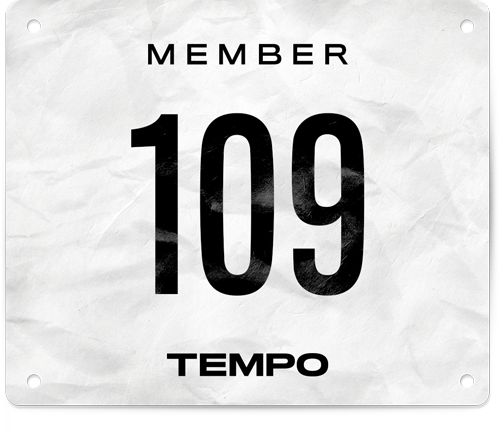Lifestyle
The addiction is real
Why being addicted to running can be harmful
Editor's Note: Lydia O'Donnell is a familiar name for TEMPO readers. Not only did Lydia captain our record breaking team at The Speed Project in 2019, she's an elite marathon runner from New Zealand who finished 20th at the New York Marathon in 2018, and recently finished 4th in the Melbourne Marathon.
On top of this, Lydia is a multiple national champion on the track, co-founder of mental health run club One Step, and a run coach.
Lydia is a columnist for TEMPO - you can read her last article, about the benefits of running for mental health, here.
You can connect with Lydia here.
Your heart is beating fast. Your nerves are building up. Your palms may be sweaty, or your mouth may be dry. You have an uneasy feeling in your gut. And your mind won’t stop talking to you. For many, these feelings may sound like lining up at the start of a race, and for others you will relate these feelings to addiction. The feeling of needing a rush of adrenalin and not being able to live without it. The feeling of guilt if you don't get it.
From 2013-2016 I ran every single day. Every week, Monday to Sunday, for every month of every year, I laced up my shoes and hit the pavement. It wasn’t something I set out to do intentionally, I didn’t set a goal to run for years and years with no break, I wasn’t part of some running streak. There was just a burden of guilt that would come over me if I wasn’t clocking kms and I was so addicted to the feeling of running and the endorphins it gave me, that like any addict, I couldn’t live without it.
Not even for a day.
Years later I have come to realize that although I genuinely love running, it is something that can get the better of you if you don’t keep tabs on your relationship with the sport. Addiction is a compulsive physiological behaviour, which is naturally seen in a negative light towards substance abuse – including drugs and alcohol. But addiction can come in many forms. The craving of a particular feeling comes from the specific pathway in the brain, providing positive energies and chemicals that make us feel good. Another term that can help us to understand this approach to a particular trait, act or function is Obsessive Compulsive Disorder (OCD).
"I was so addicted to the feeling of running and the endorphins it gave me, that like any addict, I couldn’t live without it. Not even for a day."
Lydia O'Donnell
Through running, we are releasing particular chemicals in the nervous system which provide us with a pleasure response. Throughout those years of back to back days of running, my reliance on these feelings became heightened, to the point where every day I was faced with the intense pressure and craving to feel that rush of adrenaline and those endorphins. There was a point during those years where, no matter what was going on, birthdays, Christmas, family events, I would force myself out the door because I mentally couldn’t get through a single day without my ‘hit’. If I hadn’t got up and headed out the door first thing, I would spend the day with a shadow over my head until I was able to run.
Part of me understood that the addiction was evident and that the obsession with training was real, but I had another side of me telling that ‘there is a lot worse you could be addicted to’, so I continued to push myself to run every single day. I skipped social events because I didn’t want late nights to sacrifice my training, I wouldn’t drink because it might affect how I felt the next morning on my run, I was obsessed with clocking kms and uploading them to my run app to prove to myself and to others that I can, and do, run every day.
There is this crazy obsession that I feel a lot of athletes have in comparing what we do to everyone else. Whether it be over a conversation, or in a training session, or through digital devices and apps, that places unnecessary pressures on the way we approach our training. The continuous uploading of our data to prove to ourselves, and everyone around us, that we are mentally strong and physically fit. That we are seen as ‘weak’ or ‘lazy’ if we take a day off. And these pressures add to the craving of feeling satisfaction when we do push through the pain to get an endorphin rush and have numbers on the clock each day.
The digital age of apps and smart watches definitely add to the pressure that leads to addiction of not only training, but competition between runners. For the three years of running consistently every day, I was always top of my leaderboard. If someone was nearing closer to me I would know I needed to hit the extra KMs the next day. No matter how tired or sore I was feeling. Much like the comparison element a lot of us feel on social media, comparing what we look like, the lives we live, the money we have - the relationship with the digital side of running can be unhealthy too. Looking at your competitors and analyzing what they are doing, how far and how fast they are running, is never going to make you a better athlete. All it will do is affect your confidence, and pressure you into training too much or too hard. Potentially leading to injury or fatigue.
"Looking at your competitors and analyzing what they are doing, how far and how fast they are running, is never going to make you a better athlete".
Lydia O'Donnell
What people don’t understand is that although it might be a struggle to succumb to a day off,the benefits of not running on some days will outweigh the act of pushing through a run on tired and potentially injury riddled legs. We don’t realize that by running, and running hard, every single day we will always be working at 70-80% of our maximum potential. But by allowing our bodies to recover on some days, and take a day off, we will be able to hit 100% of that potential on other days. And by getting to our maximum on our hard days we will ultimately become better athletes.
The thing with addiction, and this includes any addiction, is that it plays with our minds to the point that we begin to think irrationally. All we can concentrate on is when our next rush is coming and for our sake, as athletes, when can we upload our next lot of data.
It took me years to learn, but eventually I understood that I had to turn my addiction into a pure love and understanding for running. I spent many months forcing myself to take days off. I had to create a life where running wasn’t the only thing that brought me joy, and that I needed to respect my mental health but also protect my physical body. And then I began to see results in times and in races. My training began to improve because I was giving myself the recovery time I needed after long runs or hard training. This is when I understood that the addiction was coming under control. Because ultimately, I would much rather be a successful athlete in the real world, than the top of a leader board on a digital app. I would rather feel strong on the track in each race than give myself the satisfaction of a mental endorphin hit every day.
I definitely still struggle on days where I can’t or don’t exercise. I am not completely ok with taking days off. But understanding the purpose behind the off days and the benefit rest days can give me to relax and actually enjoy a break. My goal for running is to have a pure love for the sport and be in control of the role it plays in my life.
Respect yourself enough to know when you need a break. Don’t get caught up by what everyone else is doing. Running (not not running) should never make you feel guilty. Play the smart game for long-term success vs the hard game for any short-term feelings. Addiction to exercise is real, but we can be in control.


